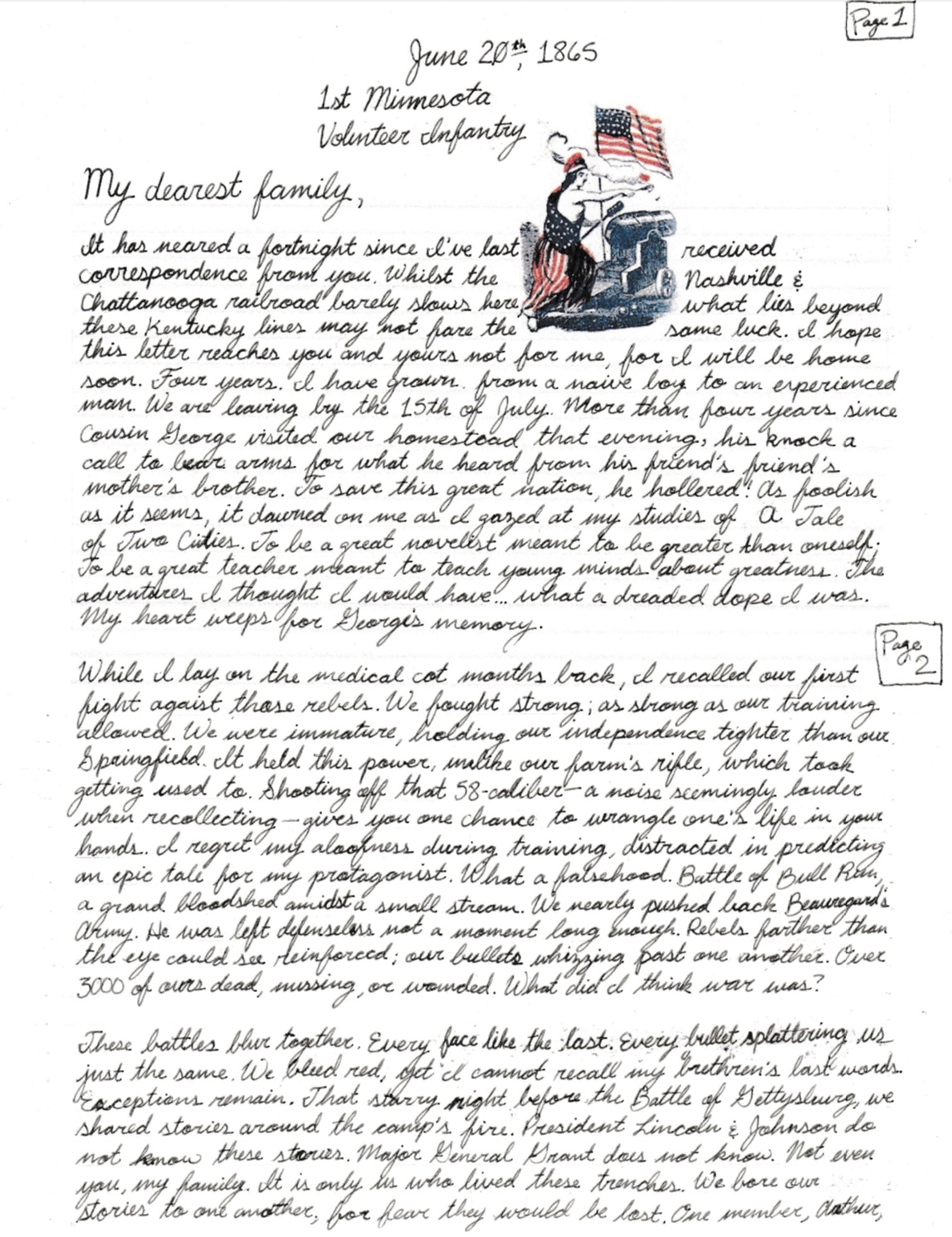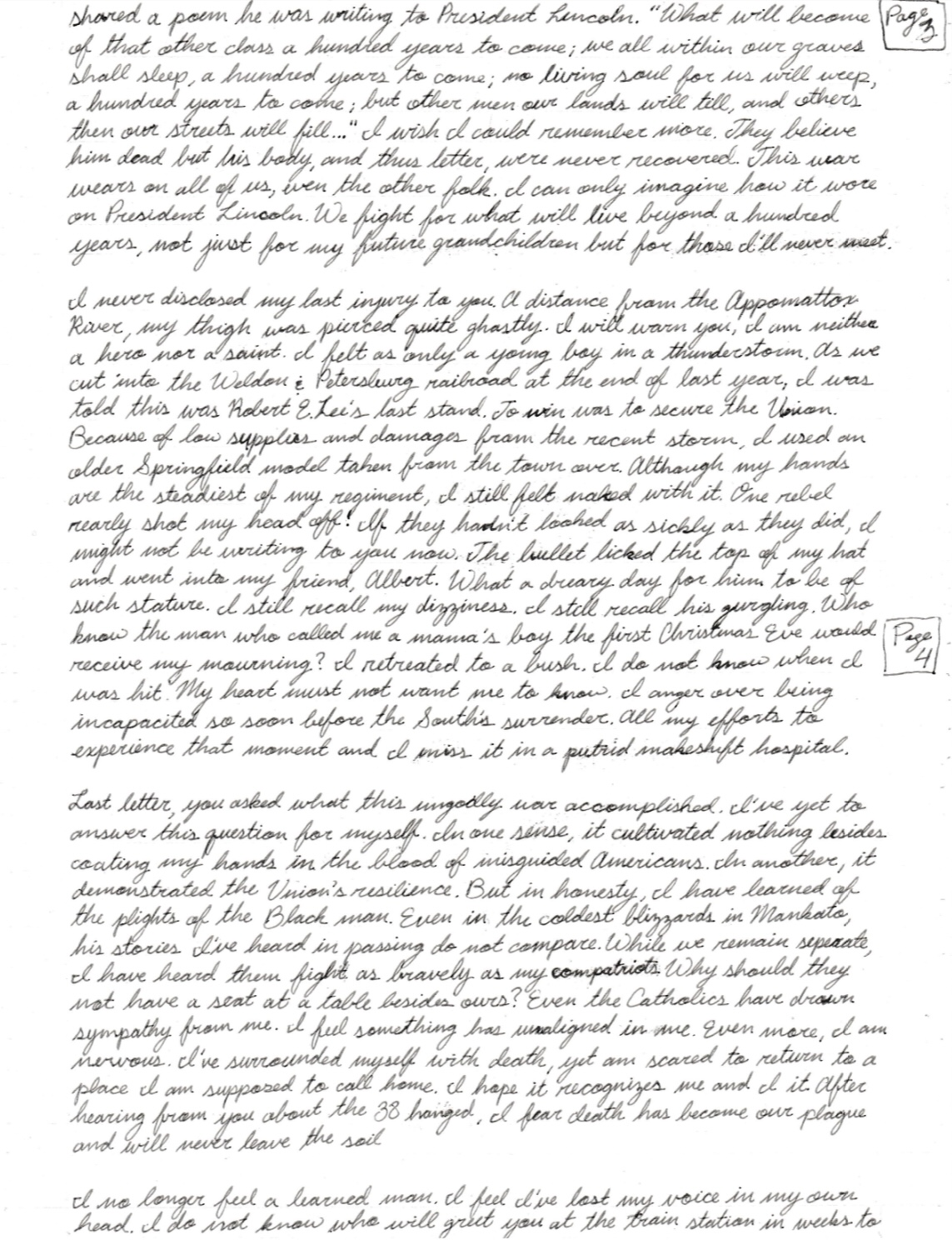H. Bones
June 20th, 1865
1st Minnesota Volunteer Infantry
My dearest family,
It has neared a fortnight since I’ve last received correspondence from you. Whilst the Nashville and Chattanooga railway barely slows here, what lies beyond these Kentucky lines may not fare the same luck. I hope this letter reaches you and yours not to me, for I will be home soon. Four years. I have grown from a naive boy to an experienced man. We are leaving by the 15th of July. More than four years since Cousin George visited our homestead that evening, his knock a call to bear arms for what he heard from his friend’s friend’s mother’s brother. To save this great nation, he hollered! As foolish as it seems, it dawned on me as I gazed at my studies of A Tale of Two Cities. To be a great novelist meant to be greater than oneself; To be a great teacher meant to teach young minds about greatness. The adventures I thought I would have…what a dreaded dope I was. My heart weeps for George’s memory.
While I lay on the medical cot months back, I recalled our first fight against those rebels. We fought strong; as strong as our training allowed. We were immature, holding our independence tighter than our Springfield. It held this power, unlike our farm’s rifle, which took getting used to. Shooting off that 58-caliber—a noise seemingly louder when recollecting—gives you one chance to wrangle one’s life in your hands. I regret my aloofness during training, distracted in predicting an epic tale for my protagonist. What a falsehood. Battle of Bull Run, a grand bloodshed amidst a small stream. We nearly pushed back Beauregard’s Army. He was left defenseless not a moment long enough. Rebels farther than the eye could see reinforced; our bullets whizzing past one another. Over 3,000 of ours dead, missing, or wounded. What did I think war was?
These battles blur together. Every face like the last. Every bullet splattering us just the same. We bleed red, yet I cannot recall my brethren’s last words. Exceptions remain. That starry night before the Battle of Gettysburg, we shared stories around the camp’s fire. President Lincoln and Johnson do not know these stories. Major General Grant does not know. Not even you, my family. It is only us who lived in these trenches. We bore our stories to one another, for fear they would be lost. One member, Arthur, shared a poem he was writing to President Lincoln. “What will become of that other class a hundred years to come; we all within our graves shall sleep, a hundred years to come; no living soul for us will weep, a hundred years to come; but other men our lands will till, and others then our streets will fill…” I wish I could remember more. They believe him dead but his body, and thus letter, were never recovered. This war wears on all of us, even the other folk. I can only imagine how it wore on President Lincoln. We fight for what will live beyond a hundred years, not just for my future grandchildren but for those I will never meet.
I never disclosed my last injury to you. A distance from the Appomattox River, my thigh was pierced quite ghastly. I will warn you, I am neither a hero nor a saint. I felt as only a young boy in a thunderstorm. As we cut into the Weldon and Petersburg railroad at the end of last year, I was told this was Robert E. Lee’s last stand. To win was to secure the Union. Because of low supplies and damages from the recent storm, I used an older Springfield model taken from the town over. Although my hands are the steadiest of my regiment, I still felt naked with it. One rebel nearly shot my head off! If they didn’t look as sickly as they did, I might not be writing to you now. The bullet licked the top of my hat and went into my friend, Albert. What a dreary day for him to be of such stature. I still recall my dizziness. I still recall his gurgling. Who knew the man who called me a mama’s boy the first Christmas Eve would receive my mourning? I retreated to a bush. I do not know when I was hit. My heart must not want me to know. I anger over being incapacitated so soon before the South’s surrender. All my efforts to experience that moment and I miss it in a putrid makeshift hospital.
Last letter, you asked what this ungodly war accomplished. I’ve yet to answer this for myself. In one sense, it cultivated nothing besides coating my hands in the blood of misguided Americans. In another, it demonstrated the Union’s resilience. But in honesty, I have learned of the plights of the Black man. Even in the coldest blizzards in Mankato, his stories I’ve heard in passing do not compare. While we remain separate, I have heard them fight as bravely as my compatriots. Why should they not have a seat at a table besides ours? Even the Catholics have drawn sympathy from me. I feel something has unaligned in me. Even more, I am nervous. I’ve surrounded myself with death, yet am scared to return to a place I am supposed to call home. I hope it recognizes me and I it. After hearing from you about the 38 hanged, I fear death has become our plague and will never leave the soil.
I no longer feel a learned man. I feel I’ve lost my voice in my own head. I do not know who will greet you at the train station in weeks to come. I only hope you find pride in what I tried to do for this wounded nation. Upon my return, you mustn’t ask after this. You have my letters as my witness, but not another story leaves my lips for the foreseeable future. I cannot bear to entertain these memories. “It was the best of times, it was the worst of times, it was the age of wisdom, it was the age of foolishness…”
Give my congratulations to Aunt Margrete and Joel for tying the knot.
Health to you all,
Hubert Bones
Quoted poem by “Arthur”: Source Here
Name: Abigail Raper
Bio: Abigail Raper—sometimes known as Sire Scribble the Scribe—is an Interdisciplinary Studies senior ready to pursue Library and Information Science at University of Wisconsin-Madison next semester. Alongside dabbling in genres such as historical fiction, Abigail enjoys writing horror and adventure stories.



